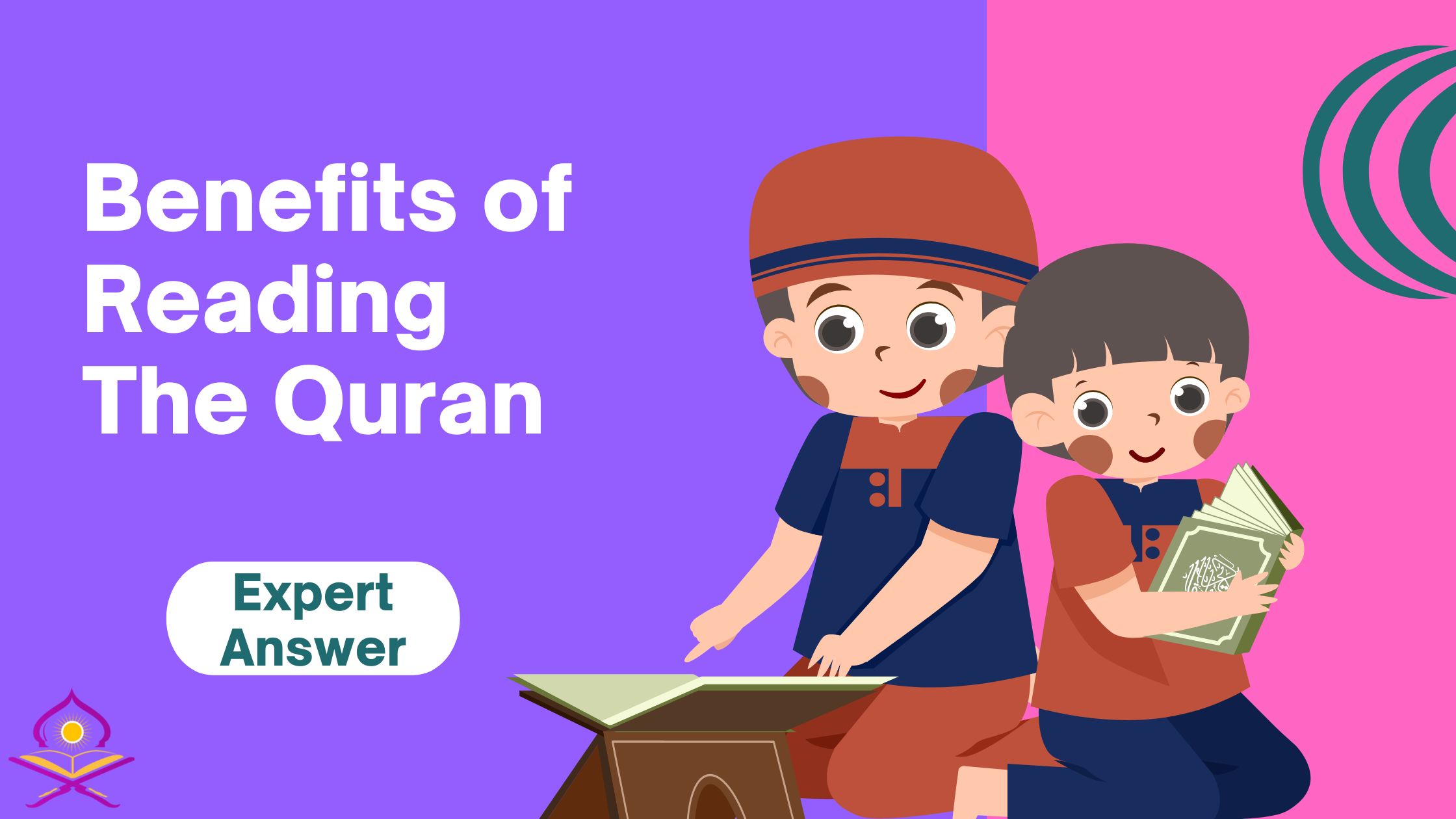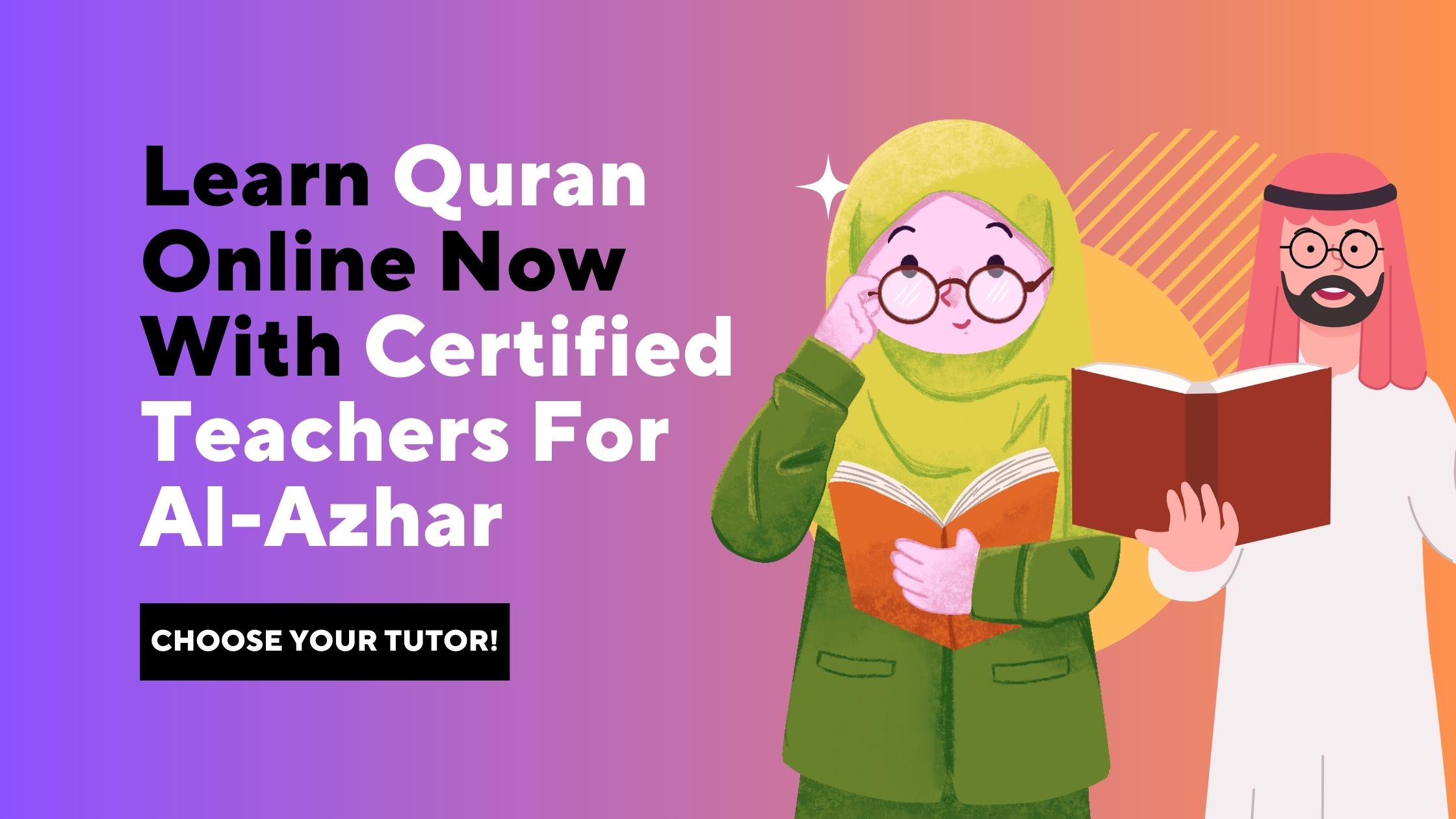The benefits of learning the Quran for kids extend far beyond mere memorization. It is a journey that nurtures their souls, sharpens their intellect, and builds their character. As they internalize the Quranic teachings, they form a stronger bond with Allah, develop a deep sense of moral integrity, and gain spiritual guidance that will serve them throughout their lives.
Moreover, the rewards of teaching the Quran to children are immeasurable, promising not only personal spiritual elevation but also a lasting positive impact on society. By instilling the Quran’s wisdom in the hearts of the young, we are cultivating a future generation rooted in faith, compassion, and resilience.
Learning the Quran is a valuable experience for all Muslims, especially kids. It offers numerous benefits beyond religious knowledge. It has the power to shape kids’ personalities, deepen their comprehension and insights, and give them essential skills for life.
In this article, we will talk about some benefits of learning the Quran for kids, why the Quran is important for kids, and what the reward of teaching the Quran to children is. Also, we will discuss the benefits of learning the Quran by heart for kids and at what age we should teach our children the Quran.
Table of Contents
What is Quran For kids?
Quran for Kids refers to Quranic resources, materials, and educational approaches specifically designed for children to learn and engage with the Quran. The Quran is written in classical Arabic and consists of 114 chapters, known as Surahs.
Quran for kids is presented in a child-friendly manner to cater to their age, understanding, and learning abilities. These resources aim to make Quranic education accessible, enjoyable, and meaningful for young learners.
Overall, Quran for Kids aims to instill a love for the Quran and its teachings from an early age. It empowers children with the knowledge and understanding of their faith, nurturing their spiritual growth and connection with Allah.
By providing kids with a solid foundation in the Quran, parents, and educators empower them to navigate life’s challenges with faith, resilience, and compassion.
Benefits of Learning the Quran for Kids:
Incorporating Quranic education into a child’s life offers a wealth of benefits that extend beyond the spiritual realm. The teachings of the Quran instill a strong moral compass, nurture cognitive skills, and promote emotional well-being.
Muslim kids are the future of our Islamic community, so they must be raised upon a strong structure and behaving methods that contain Islamic rulings and Quran as well, and here are the benefits of Learning the Quran for kids:
1- Memorizing The Quran As Fard Kifaya:
Any Hafiz [a person who memorizes the Quran] is a great blessing for their Muslim community. Why? Let’s see.
The very word “قرآن” (Quran) means, in Arabic, that it is to be read and recited rather than written down. So the Quran is, in essence, was revealed from Allah to Angel Gabriel and passed orally to Prophet Muhammad (peace be upon him) and then to Mankind, primarily orally.
So memorizing it is accomplished by listening to it and then reciting it, rather than reading and writing. This tradition helps in preserving it and passing it down through generations.
That’s why many scholars argue that memorizing the Quran is Fard Kifaya. This means that if a sufficient number of Muslims memorize the Quran in a given community, the other Muslims who do not memorize it are free from guilt. But if ALL Muslims in the community do not memorize the Quran, ALL of them are guilty.
So any Muslim who memorizes the Quran contributes to lifting the sin of non-memorizing it from other Muslims in their community. That’s why it is a great mission to be a Hafez in any Muslim community.
2- Stronger Connection to Allah:
The Quran is the direct word of Allah, Almighty. So learning it fosters a deep connection with Allah. Here is why:
A- The People Of The Quran Are Allah’s Own People:
In this context, Prophet Muhammad (peace be upon him) said:
“Allah has His own people among mankind.” They said: “O Messenger of Allah, who are they?” He said: “The people of the Quran, the people of Allah, and those who are closest to Him.”
“إِنَّ لِلَّهِ أَهْلِينَ مِنَ النَّاسِ”، قَالُوا “يَا رَسُولَ اللَّهِ مَنْ هُمْ؟” قَالَ: “هُمْ أَهْلُ الْقُرْآنِ، أَهْلُ اللَّهِ وَخَاصَّتُهُ”.
This hadith makes it clear that those who study and memorize the Quran are the people of Allah, i.e. the closest people to Him.
B- They Fulfill The Divine Command Of Good Recitation Of The Quran:
A Muslim will also be closer to Allah as they fulfill the divine command of Allah in the Quran:
“Recite the Quran ˹properly˺ in a measured way”.
.”وَرَتِّلِ ٱلْقُرْءَانَ تَرْتِيلًا”
Here, Allah, commands Prophet Muhammad (peace be upon him) and the believers who follow his example to recite the Quran “properly“.
3- Moral Guidance:
The Quran provides moral guidance and teachings that help kids develop good character. For example, kids will learn in the Quran:
A. To Be Truthful:
Truthfulness is the first moral to teach your kid. It is a fundamental value that kids should learn from a young age, as it helps them build trust and strong relationships. This value is strongly fostered in the Quran.
Allah says:
“O believers! Be mindful of Allah and be with the truthful.”
“يَـٰٓأَيُّهَا ٱلَّذِينَ ءَامَنُوا۟ ٱتَّقُوا۟ ٱللَّهَ وَكُونُوا۟ مَعَ ٱلصَّـٰدِقِينَ”
This is a direct command from Allah that Muslims must always tell the truth.
B. Cooperation:
Cooperation is a vital skill that helps kids develop strong relationships and solve problems effectively. It involves working together towards a common goal, sharing ideas, and finding creative solutions. This value is also emphasized in the Quran.
Allah says:
“Cooperate with one another in goodness and righteousness, and do not cooperate in sin and transgression”
“وَتَعَاوَنُوا۟ عَلَى ٱلْبِرِّ وَٱلتَّقْوَىٰ ۖ وَلَا تَعَاوَنُوا۟ عَلَى ٱلْإِثْمِ وَٱلْعُدْوَٰنِ”
Here, Allah commands all Muslims to cooperate only in good endeavors and do not take part in evil ones.
C. Caring for parents:
Caring for parents is a cornerstone of Islamic ethics. It is considered a mark of piety and righteousness. Kids must be taught how to be kind to their parents. The Quran gives so much significance to this value.
Allah says:
“And honour your parents. If one or both of them reach old age in your care, never say to them ˹even˺ ‘ugh,’ nor yell at them. Rather, address them respectfully.”
“وَبِٱلْوَٰلِدَيْنِ إِحْسَـٰنًا ۚ إِمَّا يَبْلُغَنَّ عِندَكَ ٱلْكِبَرَ أَحَدُهُمَآ أَوْ كِلَاهُمَا فَلَا تَقُل لَّهُمَآ أُفٍّۢ وَلَا تَنْهَرْهُمَا وَقُل لَّهُمَا قَوْلًۭا كَرِيمًۭا”
According to this verse, kids should love and care for their parents. The slightest emotional harm to the parents is strictly forbidden.
D. Kindness to the poor, the orphans, and even to the captives (war prisoners):
Teaching kids to be kind to the poor, orphans, and captives is an essential part of the Islamic uprising. These acts of compassion not only reflect the values of Islam but also foster empathy and a sense of responsibility in kids. The Quran also stresses this value.
Allah says:
“Give food—despite their desire for it—to the poor, the orphan, and the captive”
” وَيُطْعِمُونَ ٱلطَّعَامَ عَلَىٰ حُبِّهِۦ مِسْكِينًۭا وَيَتِيمًۭا وَأَسِيرًا”
Muslims here are praised for feeding those in need and the orphans, and even war prisoners, even though they do not have enough food to feed themselves and their families.
4- Companionship Of The Honorable And Obedient Scribes (Angels):
Those who memorize the Quran are with the noble angels. This is quite clear in the following hadith by Prophet Muhammad (peace be upon him):
“The one who is proficient in the recitation of the Quran will be with the honorable and obedient scribes (angels) and he who recites the Quran and finds it difficult to recite, doing his best to recite it in the best way possible, will have two rewards.”
.”الذي يقرأ القرآن وهو ماهر به مع السفرة الكرام البررة، والذي يقرأ القرآن ويتتعتع فيه وهو عليه شاق له أجران”
This Hadith clarifies that there are 2 types of people reciting the Quran, one of them is a good reciter who follows Tajweed rules. This person recites the Quranic words and verses accurately and follows the rules of Tajweed. The reward for this type of recitation is that he/she will be with the honorable and obedient scribes (angels).
5- Guidance:
Reciting and understanding the Quran can contribute to a kid’s guidance. Umar bin Al-Khattab (May Allah be pleased with him) reported:
The Prophet (ﷺ) said: “Verily, Allah elevates some people with this Qur’an and abases others.”
“إن الله يرفع بهذا الكتاب أقوامًا ويضع به آخرين”.
This hadith stresses the fact that those Muslims who abide by the Quran are honorable and those who disobey the Quran are humiliated.
6- Intercession On The Day Of Judgement:
On the Day of Judgement, the Quran will intercede in front of Allah for those who used to recite it regularly. This is clear in the following Hadith by Prophet Muhammad (peace be upon him):
“Fasting and the Quran intercede for a man. Fasting says, ‘O my Lord, I have kept him away from his food and his passions by day, so accept my intercession for him.’ The Quran says, ‘I have kept him away from sleep by night, so accept my intercession for him.’ Then their intercession is accepted.”
“الصِّيَامُ وَالْقُرْآنُ يَشْفَعَانِ لِلْعَبْدِ، يَقُولُ الصِّيَامُ: أَيْ رَبِّ إِنِّي مَنَعْتُهُ الطَّعَامَ وَالشَّهَوَاتِ بِالنَّهَارِ فَشَفِّعْنِي فِيهِ، وَيَقُولُ الْقُرْآنُ: مَنَعْتُهُ النُّوْمَ بِاللَّيْلِ فَشَفِّعْنِي فِيهِ، فيشفعان”.
In this Hadith, Prophet Muhammad (peace be upon him) urges Muslims to read the Quran as it will intercede for them on the Day of Judgement.
7- Attainment Of Higher Positions In Jannah:
Memorizing the Quran grants the person a much higher place in Jannah.
In this regard, Prophet Muhammad (peace be upon him) said:
“It shall be said – meaning to the one who memorized the Quran – ‘Recite, and rise up, recite (melodiously) as you would recite in the world. For indeed your rank shall be at the last Ayah [verse] you recited.'”
.”يُقَالُ يَعْنِي لِصَاحِبِ الْقُرْآنِ اقْرَأْ وَارْتَقِ وَرَتِّلْ كَمَا كُنْتَ تُرَتِّلُ فِي الدُّنْيَا فَإِنَّ مَنْزِلَتَكَ عِنْدَ آخِرِ آيَةٍ تَقْرَأُ بِهَا”
This is a great privilege for Muslims who memorize the Quran. The more they memorize, the higher they get in Jannah.
8- Spiritual Development:
The Quran instills a deep sense of spirituality and connection to Allah. Understanding its teachings helps children develop faith and trust in Allah’s wisdom and mercy.
9- Cultural Identity:
Learning the Quran strengthens a child’s sense of identity as a Muslim. It connects them to their cultural and religious heritage, fostering a sense of belonging within the Muslim community.
10- Intellectual Growth:
The Quran encourages critical thinking and reflection. Engaging with its teachings can enhance a child’s cognitive skills and intellectual curiosity.
11- Emotional Well-being:
The Quran offers comfort and solace during difficult times. Children who learn the Quran can find peace and reassurance in its verses.
12. A greater understanding of Islam rulings.
Hifz and learning the Quran make the Muslim child know more about Islam and what his/her purposes in life are as a Muslim, also providing a better understanding of all Islamic rulings which led he/she to be better versions of themselves.
What Is The Reward Of Teaching the Quran To Children?
It is noteworthy that the ultimate reward for teaching the Quran to children lies with Allah, the All-Knowing, and no human being can truly appreciate the extent of His blessings. The Quran itself, however, places a strong emphasis on the value of spreading knowledge, especially religious understanding.
1- Becoming the Best Muslim, according to the Prophet:
Perhaps, the most obvious and well-known reward for teaching the Quran is mentioned in the following hadith by Prophet Muhammad (peace be upon him):
“The best among you is he who learns and teaches the Quran.”
«خَيْرُكُمْ من تعلم الْقُرْآن وَعلمه»
In this hadith, Prophet Muhammad (peace be upon him) clarifies that the best Muslims are those who learn the Quran and then teach it to other Muslims.
2- Continuous Charity (Sadaqah Jariyah):
Teaching the Quran is considered a form of continuous charity. The rewards continue even after the teacher passes away, as long as the students continue to benefit from the knowledge.
3- Spiritual Elevation:
Teaching the Quran elevates one’s spiritual status. It is a noble act that brings the teacher closer to Allah and increases their faith.
4- Positive Impact on Society:
By teaching the Quran, individuals contribute to the moral and spiritual development of society. This has a ripple effect, promoting peace, compassion, and justice.
Why Is The Quran Important For Kids?
The Quran is so important for kids for several reasons. It provides them with a moral compass, moral guidance, and a strong foundation for faith. Let’s see some of these aspects in detail:
1- Fosters a Connection to Allah and Spiritual Guidance:
As we have seen above, the Quran provides moral guidance and teachings that help kids develop good character and values and be more connected to their Creator.
2- Provides a Strong Foundation for More Islamic Studies:
Studying the Quran, especially from a young age, can be beneficial for further Islamic education.
3- Strengthens Language Skills:
Learning Arabic, the language of the Quran, enhances vocabulary and language skills.
4- Enhances Critical Thinking:
When a kid understands the Quran’s teachings, this fosters their critical thinking and analysis.
5- Provides Cultural Understanding:
Learning the Quran provides insights into Islamic culture and history and even the history of earlier nations.
6. Enhanced Cognitive Skills:
Learning the Quran involves memorization, reading, and understanding Arabic. These cognitive processes stimulate brain development, improve memory retention, and enhance linguistic abilities. Quranic education can have a positive impact on a child’s overall intellectual growth.
7. Self-Discipline and Focus:
The process of memorizing the Quran requires dedication, discipline, and focus. As kids strive to memorize verses and Surahs, they learn self-discipline, perseverance, and the importance of consistent effort. These qualities can translate into other areas of their lives, such as academics and personal goals.
8. Emotional Well-being and Tranquility:
Reciting and pondering over the Quranic verses can bring a sense of tranquility and peace to children’s hearts. Quranic teachings offer solace during challenging times and provide emotional support. Children find comfort in turning to the Quran as a source of guidance and reassurance.
9. Sense of Identity and Belonging:
Learning the Quran connects children to their Islamic identity and heritage. It strengthens their sense of belonging to the Muslim community and creates a shared bond with other believers worldwide.
10. Improved Arabic Language Skills:
Learning the Quran introduces kids to the Arabic language, which is the language of the Quran. As they study Arabic to read, recite, and understand the Quran, their language skills improve. This knowledge can also benefit them in their studies of other languages later on.
11. Building Strong Faith Foundations:
Early exposure to the Quran lays the groundwork for a strong faith foundation. Children who learn the Quran from a young age are more likely to develop a deep and unwavering faith, which sustains them throughout their lives.
12. Personal and Social Development:
Quranic education helps in the holistic development of children. It nurtures their spirituality, intellect, emotional intelligence, and social skills. Kids who learn the Quran tend to exhibit better self-awareness, empathy, and respect for others.
Also read: Best Websites To Learn The Quran.
13. Connection to Islamic History:
The Quran contains stories of the Prophets and their communities from the past. By learning the Quran, kids gain insight into Islamic history and draw lessons from the experiences of those who came before them.
14. Cultural and Spiritual Identity:
Learning the Quran strengthens a child’s cultural and spiritual identity as a Muslim. It deepens their understanding of Islamic traditions, rituals, and values.
15. Influence on Positive Behavior:
Quranic teachings promote honesty, integrity, and good behavior. As children internalize these values, they are more likely to exhibit positive behavior in their daily interactions.
16. Stress Reduction and Calmness:
Reciting and listening to the Quran can have a calming and soothing effect on children. The rhythmic and melodious recitation of the Quran can reduce stress and anxiety, promoting emotional well-being.
17. Resilience and Patience:
Learning the Quran requires patience and perseverance, especially in memorization. Children develop resilience and the ability to stay persistent in achieving their goals, both within Quranic studies and in other aspects of life.
18. Strengthening Family Bonds:
When parents and siblings engage in Quranic learning together, it strengthens family bonds. Quranic reading sessions, discussions, and memorization become family activities that promote unity and a shared spiritual journey.
By integrating Quranic learning into a child’s life, parents and educators provide them with a holistic education that nurtures their spiritual, emotional, and intellectual growth. The Quran becomes a source of wisdom, inspiration, and strength, guiding children on the path of righteousness and helping them become better individuals in society.
2. Specified goals in life.
Making children learn Quran from the early stage of life and making them understand Islamic rulings step-by-step besides building in them the right perspective of Islamic life, will help them grow to be better productive Muslims that set their goals to succeed in this life and hereafter as well.
Learning the Quran imparts a sense of purpose and direction in a child’s life. The Quranic teachings help kids understand their role in this world and their responsibility towards others. It instills a sense of purposeful living based on pleasing Allah and contributing positively to society.
3. Having a fingerprint over generations and erasing the myth.
Raising children upon Hifz Quran in the very early stages of life will make them follow the same steps as well with their future children and family as they knew the importance of such an act because of the way of raising them and they will be having a strong understanding of the old myth that was common between old generations.
4. Spiritual Guidance and Connection to Allah:
Learning the Quran provides children with spiritual guidance and fosters a deep connection to Allah. As they recite, memorize, and understand the verses, they develop a sense of closeness to the Creator and a greater appreciation for His divine guidance in their lives.
Benefits Of Learning the Quran By Heart For Kids:
Learning the Quran by heart has so many benefits for kids. They can be spiritual, personal, and even collective benefits for the Muslim community as a whole. These include to name but a few:
1- More Reward:
Memorizing the Quran is considered an act of worship and grants great rewards. It also grants your kid the ability to easily access and recite verses for daily prayers. Imagine if your kid has no access to a Quran, they can still recite verses from the Quran from their memory and get more and more rewards.
2- Memory Improvement:
Reciting and memorizing Quranic verses can enhance memory massively. Memorizing the Quran can strengthen memory muscles and improve overall cognitive function. The repetitive nature of memorizing Quranic verses requires constant practice and review. This regular practice helps solidify the information in the brain.
3- Personal Growth:
Learning the Quran by heart requires a lot of patience and discipline, which are valuable life skills. So memorizing the Quran can boost patience and self-discipline in your kid’s soul.
4- Using Correct Places Of Articulation:
In Tajweed, the term “places of articulation” (مخارج الحروف) refers to the specific places in the vocal tract where the different Arabic letters are produced. For example, in Arabic, there is a big difference between pronouncing the letters ق and ك as well as the letters س and ص.
This correct pronunciation of Arabic letters is best accomplished through Tajweed which is part and parcel of memorizing the Quran.
This can be beneficial for your kid’s future career in fields like reporting, voice-over, etc.
5- Community Involvement:
Engaging in Quranic memorizing initiatives or contests can promote a feeling of inclusion, belonging, and connection within Islamic society in your kid’s heart.
6- Making Good Friends:
A kid’s ability to make good friendships based on common interests and beliefs can be enhanced by learning the Quran. Kids can feel comfortable and form friendships in the positive and encouraging environment that Quranic classes or groups guarantee.
So friendships can be strengthened by the shared experiences and memories that arise from studying the Quran together.
7- Keeping Your Child Busy:
Memorization requires consistent practice and review, which can occupy your child’s time and energy. This is especially important for kids. Engaging in Quranic activities, such as recitation, memorization competitions, or Quranic quizzes, can provide a stimulating and enjoyable way to spend time.
In this context, the great Muslim scholar, Ibn Al-Qaim [ابن القيم], may Allah have mercy upon him, said:
“The soul, if you do not occupy it with the truth, will occupy you with falsehood.”
[فهي النفس إن لم تشغلها بالحق شغلتك بالباطل].
This means that your soul will naturally drift toward evil and wicked conduct if you do not actively engage it in good activities and righteousness.
8- Discipline and Focus:
Hifz requires dedication, discipline, and focus. These qualities are cultivated through regular practice and repetition, helping children develop a strong work ethic and perseverance.
9- Closeness to Allah:
Memorizing the Quran fosters a deep connection with Allah. It encourages children to reflect on the meanings of the verses and apply them in their daily lives.
10- Community Respect:
Those who memorize the Quran are highly respected within the Muslim community. This respect can boost a child’s confidence and sense of accomplishment.
At What Age Do I Teach My Child the Quran?
The ideal age to start teaching your child the Quran can vary depending on individual traits and learning styles. However, many parents begin introducing their kids to the Quran from as young as 3-5 years old.
Here are some factors to consider when deciding when to start teaching your child the Quran:
1- Child’s Readiness:
Observe your child’s interest in learning and their ability to focus.
2- Parental Availability:
Consider your schedule and availability to teach your kid or find him/her a suitable teacher. If you have limited spare time to spend with your kid, you may consider starting to teach your kid the Quran at a slightly older age when they are more self-dependent.
3- Cultural Practices:
Early Quranic education is customary in certain Muslim communities. So follow the norm so that your kid can easily find potential friends to accompany them on this noble journey.
Practical Tips for Teaching Quran to Children
To make the process of learning the Quran enjoyable and effective, consider these practical tips:
1- Create a Positive Environment:
Make Quranic learning a positive and rewarding experience. Use praise and encouragement to motivate children.
2- Set a Routine:
Establish a regular routine for Quranic study. Consistency helps reinforce learning and builds a habit of daily engagement with the Quran.
3- Use Interactive Tools:
Utilize interactive tools such as educational apps, videos, and online classes to make learning engaging. These resources can complement traditional teaching methods and cater to different learning styles.
4- Incorporate Stories:
Teach the Quran through stories that highlight its teachings and moral lessons. Stories about the prophets and companions can captivate children’s interest and help them relate to the Quranic messages.
5- Participate in Community Activities:
Encourage participation in community activities such as Quranic competitions, study groups, and mosque events. This fosters a sense of community and provides additional learning opportunities.
6- Be Patient and Supportive:
Learning the Quran is a gradual process that requires patience and support. Be understanding of your child’s pace and provide continuous encouragement.
Learning the Quran with Tajweed at home for kids and beginners.
Our online Quran academy is pleased to announce that we have a lot of different courses and classes for those who are seeking to Hifz Quran with Tajweed whether for children or themselves as beginners. We have courses suitable for all ages with developed learning methods to make the learning journey more effective and productive for all our students.
🎓 Expert Guidance:
Benefit from experienced instructors who specialize in Tajweed, breaking down complex rules into manageable segments for learners of all levels.
✨ Key Features:
- Structured, step-by-step learning approach.
- Access to high-quality instructional materials.
- Real-time feedback from qualified tutors to enhance your practice.
- Flexible learning schedules to accommodate your pace and convenience.
- Immerse yourself in the melodious tones of Quranic recitation, enriching your spiritual experience.
🌟 Why Choose Bayan Al-Quran?
Join our vibrant community dedicated to perfecting Quranic recitation. Build a profound connection with the divine words of the Quran and enrich your spiritual journey. Choose Bayan Al-Quran for a transformative learning experience and embark on a path to mastering Tajweed with confidence.
You can also attend online Quran Classes with Bayan al-Quran with Native Arab tutors. There are also several courses that can help you in this regard:
- Online Quran Classes For Kids
- Learn Arabic Online For Kids
- Islamic Studies Online Course
- Noorani Qaida Online Course For Kids And Adults
- Arabic Tutors Online
Conclusion:
In conclusion, the benefits of learning the Quran for children extend far beyond mere memorization. It fosters a deep connection with Allah, instills strong moral values, and enhances cognitive abilities. By engaging with the Quran, children develop a strong spiritual foundation, a sense of cultural identity, and the discipline needed for personal growth.
Furthermore, the Quran’s teachings guide them towards becoming compassionate, truthful, and cooperative individuals. As they grow, the Quran serves as a lifelong source of guidance, comfort, and wisdom, ensuring that they remain close to Allah and contribute positively to their community.




















